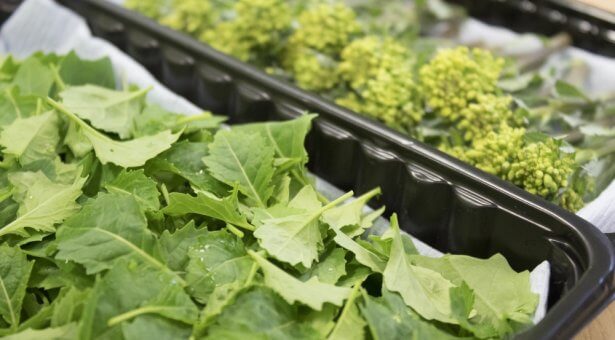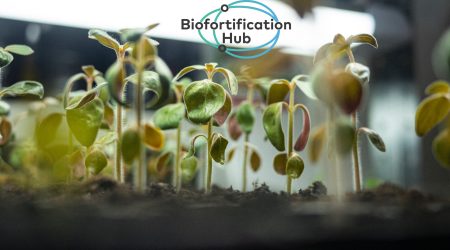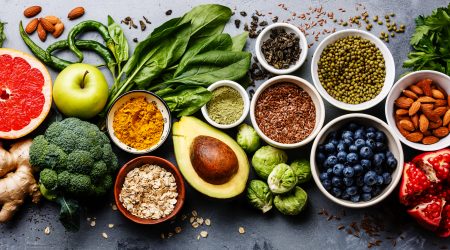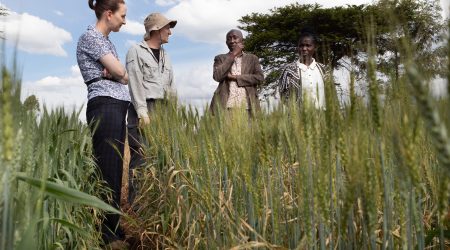Scientists remove reliance on seasonality in new line of broccoli – potentially doubling crop production

Scientists at the John Innes Centre are developing a new line of fast-growing sprouting broccoli that goes from seed to harvest in 8-10 weeks.
It has the potential to deliver two full crops a season in-field or it can be grown all year round in protected conditions, which could help with continuity of supply, as growers would no longer be reliant on seasonal weather conditions.
The part of the broccoli plant that we eat is the flower buds. This innovation in crop production builds on the wealth of fundamental research carried out by Professor Dame Caroline Dean and her lab on vernalisation – the need for some plants to experience a period of cold weather before they can flower. The timing of the switch to flowering is critical for a plant’s adaptation to the environment and its resulting yield. Dr Judith Irwin and her team, working collaboratively with Professor Dean, have focused on translating this knowledge to Brassica crop species.
Many crops rely on this period of cold before they can flower and so are very susceptible to fluctuating winter temperatures. Recent adverse weather in Murcia, Spain led to a shortage of courgettes, iceberg lettuce and broccoli. The team at the John Innes Centre have been working on ways to increase crop productivity and reduce our vulnerability to fluctuations in climate.
Dr Irwin said: “We harnessed our knowledge of how plants regulate the flowering process to remove the requirement for a period of cold temperature and bring this new broccoli line to harvest faster. This means growers could turn around two field-based crops in one season, or if the broccoli is grown in protected conditions, 4-5 crops in a year.”
This line has been developed with strategic funding from the Biotechnology and Biological Sciences Research Council (BBSRC). The John Innes Centre aims to provide pre-breeding material to plant breeders and growers for year-round scheduling of Brassica vegetables.
The consequences of our changing climate are one of the main issues facing crop production. The British Food Report published on 16 February 2017 together with recent headlines have shown how vulnerable our vegetable supply is to adverse weather conditions, both at home and abroad. The UK’s reliance on imported vegetables is particularly acute with only 23% of our fruit and vegetables grown in the UK (British Food report 2017).
In addition to having a short growing period, there is the opportunity to move production into urban farms enabling reductions in the carbon footprint of food production and supply.
Dr Jonathan Clarke, Head of Business Development at JIC said:
“The continuity of food production is being challenged by changes in our climate. Here at the John Innes Centre we have been challenging the way people think about how we produce food. As part of this approach we are considering the potential of moving some forms of food production into contained horticultural production systems – these could range from simple glasshouse or growth rooms to more complex vertical farms. This new line of broccoli could be grown in such systems and would overcome the problem of seasonality and our dependence on imported crops.”
The new broccoli line developed at the John Innes Centre is one of a number that have been selected to address this issue and as a step toward climate-proofing our crops.
Dr Irwin said: “This is a very exciting development as it has the potential to remove our exposure to seasonal weather fluctuations from crop production. This could mean broccoli – and in future other vegetables where the flower is eaten, for example, cauliflowers – can be grown anywhere at any time enabling continuous production and supply of fresh local produce.”
Judith and her team identified the new line as part of JIC’s GRO Institute Strategic Programme. They were surprised to see how rapidly it grew from seed to harvestable sprouting broccoli spears. Detailed analysis identified the gene responsible for this trait. They are now testing further generations under conventional glasshouse and controlled environment conditions. This line has been developed using conventional breeding techniques.
In order for this experimental line to move towards commercialisation the next steps involve flavour and nutritional analysis and performance testing under true protected and field commercial growing conditions.
Dr Irwin will discuss the new line of broccoli at an Agri-Tech East’s ‘Nutritious and Delicious’ event at the Institute of Food Research, Norwich on 22 February.



